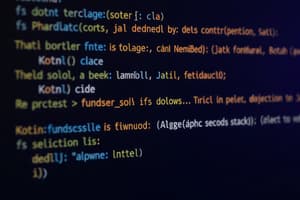Podcast
Questions and Answers
Kotlin was officially announced in 2011 and became an official language for Android development in 2017.
Kotlin was officially announced in 2011 and became an official language for Android development in 2017.
False (B)
Kotlin is an interpreted programming language.
Kotlin is an interpreted programming language.
True (A)
Kotlin significantly reduces boilerplate code compared to Java.
Kotlin significantly reduces boilerplate code compared to Java.
True (A)
Null pointer exceptions are eliminated in Kotlin using nullable and non-nullable types.
Null pointer exceptions are eliminated in Kotlin using nullable and non-nullable types.
Kotlin supports only object-oriented programming features.
Kotlin supports only object-oriented programming features.
Extension functions in Kotlin can only be added to classes that are defined in the same project.
Extension functions in Kotlin can only be added to classes that are defined in the same project.
Kotlin does not allow the use of Java libraries.
Kotlin does not allow the use of Java libraries.
Coroutines in Kotlin are used to simplify asynchronous programming.
Coroutines in Kotlin are used to simplify asynchronous programming.
Kotlin has excellent support in tools like IntelliJ IDEA and Android Studio.
Kotlin has excellent support in tools like IntelliJ IDEA and Android Studio.
The Kotlin community has been declining in size and contributions.
The Kotlin community has been declining in size and contributions.
Flashcards are hidden until you start studying
Study Notes
Overview of Kotlin
- Kotlin is a modern programming language developed by JetBrains.
- Officially announced in 2011; became an official language for Android development in 2017.
- Statically typed, fully interoperable with Java.
Features
- Conciseness: Reduces boilerplate code significantly compared to Java.
- Null Safety: Designed to eliminate null pointer exceptions using nullable and non-nullable types.
- Functional Programming: Supports functional programming features such as first-class functions and higher-order functions.
- Extension Functions: Allows adding new functions to existing classes without modifying them.
- Coroutines: Simplifies asynchronous programming with lightweight threads.
Syntax
- Basic Declaration:
- Variables:
valfor read-only,varfor mutable. - Data types: Int, String, Boolean, etc.
- Variables:
- Control Structures: Similar to Java (if, when, for, while).
- Classes and Objects:
- Simple class declaration:
class ClassName { /* properties and methods */ } - Data classes for simple data holding with automatic getters, setters, and
toString().
- Simple class declaration:
Interoperability
- Can use existing Java libraries and frameworks seamlessly.
- Allows gradual migration of projects from Java to Kotlin.
Common Use Cases
- Android Application Development
- Web Development (via Kotlin/JS)
- Server-side Development (Kotlin/Backend)
- Data Science and Scripting
Tooling and IDE Support
- Excellent support in IntelliJ IDEA and Android Studio.
- Built-in tools for code analysis, refactoring, and debugging.
Community and Ecosystem
- Growing community with extensive libraries and frameworks.
- Active contributions in repositories like GitHub.
Learning Resources
- Official documentation and tutorials.
- Online courses and coding platforms (e.g., JetBrains Academy, Coursera).
Advantages
- Enhanced productivity due to concise syntax.
- Improved readability and maintainability of code.
- Strong support for modern programming practices and paradigms.
Kotlin Overview
- Modern programming language developed by JetBrains
- Officially announced in 2011 and became an official Android development language in 2017
- Statically typed and fully interoperable with Java
Features
- Conciseness: Reduces boilerplate code compared to Java
- Null Safety: Prevents null pointer exceptions by distinguishing between nullable and non-nullable types
- Functional Programming: Supports the functional programming paradigm with features like first-class functions and higher-order functions
- Extension Functions: Allows adding new functions to existing classes without modifying the original class
- Coroutines: Simplifies asynchronous programming using lightweight threads
Syntax
- Basic Declaration:
- Variables:
valfor read-only,varfor mutable - Data Types:
Int,String,Boolean, etc.
- Variables:
- Control Structures: Similar to Java ( if, when, for, while)
- Classes and Objects:
- Simple class declaration:
class ClassName { } - Data classes for simple data holding with automatic getters, setters, and
toString()
- Simple class declaration:
Interoperability
- Seamlessly uses existing Java libraries and frameworks
- Supports gradual migration of projects from Java to Kotlin
Common Use Cases
- Android Application Development
- Web Development (via Kotlin/JS)
- Server-side Development (Kotlin/Backend)
- Data Science and Scripting
Tooling and IDE Support
- Excellent support in IntelliJ IDEA and Android Studio
- Includes built-in tools for code analysis, refactoring, and debugging
Community and Ecosystem
- Growing community with extensive libraries and frameworks
- Active contributions in repositories like GitHub
Learning Resources
- Available through official documentation, tutorials, online courses, and coding platforms (e.g., JetBrains Academy, Coursera)
Advantages
- Enhanced productivity due to concise syntax
- Improved readability and maintainability of code
- Strong support for modern programming practices and paradigms
Studying That Suits You
Use AI to generate personalized quizzes and flashcards to suit your learning preferences.



